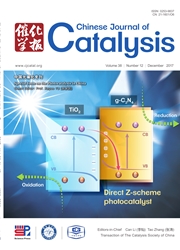

 中文摘要:
中文摘要:
比较了5种不同商品化脂肪酶和自制的华根霉CCTCC M201021全细胞脂肪酶(RCL)催化油脂合成生物柴油的转化效果,结果表明,RCL能有效应用于无溶剂体系催化合成生物柴油.在无溶剂体系中对该酶催化生物柴油的转酯化反应工艺进行优化,考察了甲醇用量、体系含水量、酶的添加量和反应温度对生物柴油收率的影响,使生物柴油最终收率大于86.0%.在有机溶剂体系中选择不同有机溶剂作为助溶剂进行转酯化反应,发现log P值在4.0~4.5的有机溶剂具有较好的转化效果.其中以正庚烷为助溶剂的转酯化反应具有最高的生物柴油收率86.7%.在无溶剂体系中RCL催化转化油酸和模拟高酸价油脂合成脂肪酸甲酯的研究表明,该酶具有很好的催化合成生物柴油的潜力.
 英文摘要:
英文摘要:
Compared with five commercial lipases, the whole-cell lipase of Rhizopus chinensis CCTCC M201021 (RCL) showed high catalytic ability in the transesterification of soybean oil to fatty acid methyl ester (biodiesel) in the solvent-free system. The effect of reaction parameters including methanol content, water content, lipase amount, and reaction temperature on transesterification was investigated. The biodiesel yield was more than 86.0 % in the solvent-free system under the optimal reaction conditions. The effect of different organic solvents on the transesterification indicated that the best one was n-heptane with higher log P values (4.0-4.5) . The whole-cell lipase was also proved to be an efficient and potential biocatalyst for biodiesel production from oleic acid and simulant high acid value oil in the solvent-free system.
 同期刊论文项目
同期刊论文项目
 同项目期刊论文
同项目期刊论文
 期刊信息
期刊信息
